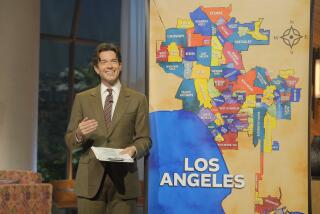‘UpClose’ gets personal
- Share via
NEW YORK — “Doonesbury” creator Garry Trudeau hasn’t done an extended television interview in 30 years, but next week, ABC’s late-night news program “UpClose” draws him out of his self-imposed media shell for two nights.
“UpClose” approached him out of “sheer orneriness,” jokes Ted Koppel, anchor of “Nightline,” from which “UpClose” was spun off. “If he had avoided interviews for so long, we figured he must have something to hide.” For his part, Trudeau says he accepted this time, somewhat to his own surprise, because working late at night, he had stumbled on the show and become a fan.
The program airs at 12:05 a.m. in New York, where Trudeau lives, and on KABC, and even later in some other cities.
“The conversations seemed so intimate and relaxed, there was almost a coffeehouse feel,” Trudeau says. “Everything seemed designed to allow the guest to tell his story with a minimum of static and interruption.” Unlike much of television, he says, “there was no pressure to talk in sound bites, no guests and hosts matching wits, no one selling anything.”
It’s a second major “get” for the interview show -- which also landed the press-shy David Letterman for its first broadcast in July -- but it may end up being one of its last. “UpClose” is scheduled to end on Jan. 24, having been created as filler for the 7 1/2 months between the demise of Bill Maher’s “Politically Incorrect” and the launch of “The Jimmy Kimmel Show.”
The program is an oddity in the slick world of network television news. It has few celebrity guests, low-key conversations that meander, no major news-making headlines that emerge. The look is minimal, with just the interviewer -- Koppel or one of the “Nightline” correspondents -- and subject, over a small table, with a bland background.
Those factors go against the grain but have worked to draw out some guests like Trudeau, who often shun the medium or have been shunned by it because they don’t talk fast enough.
Koppel originally pushed executive producer Tom Bettag to give the profiles a glossier feel, with more outside-the-studio pictures and commentary from people other than the guest.
“I thought he was being a little too bare bones.... I didn’t have enough confidence in the basic interesting-ness of just sitting down and talking to interesting people,” Koppel says.
“Television producers are in love with all the pictures and all of our whiz-bang,” Bettag says. “But we found that the power of the conversation, when two people really hit it off, is more powerful than we thought.”
The cameras are far back but a telephoto lens gives a sense of “just the two of us,” Bettag says.
Even guests who aren’t comfortable with television, such as Montgomery County, Md., Police Chief Charles Moose, who oversaw the recent Washington, D.C.-area sniper investigation, open up.
The show, freed from the need to spike its ratings because it will be gone soon, has profiled some lesser-known people, such as surgeon Ben Carson and blind mountain climber Erik Weihenmayer. About 2.3 million viewers have tuned in on average this season, or about just under half of what NBC’s “Tonight” show with Jay Leno draws to win the midnight half-hour.
The proposal for “UpClose” had been on the table for months before ABC and parent Walt Disney Co. tried to kill off “Nightline” to make room for David Letterman, who ultimately stayed at CBS. That episode opened the way, ironically, for “UpClose,” which Disney chose to fill the gap before Kimmel could get his show going.
Although “UpClose” is slated to end in two months, Bettag says the staff “would kill to do it on any venue that would have it,” and there is some hope that a new home might be found. “The conversations are just starting now,” Bettag says.
In the meantime, for Koppel, the program’s limited run has been freeing: “There’s a wonderful no-lose quality about doing this broadcast.” Koppel revels in talking with guests for longer than he can on “Nightline,” which is usually done live or taped as if it were live.
With live interviews, Koppel says, “you can’t afford to be patient; there’s not enough time to listen to people at length. People who like to take three, four, five minutes to tell a story have very little place on live television.”
Both programs are a half-hour, but “UpClose” interviews often run longer and are edited, or they air over two nights, as Trudeau’s will, on Tuesday and Wednesday.
“I love being able to listen to people without having to interrupt,” says Koppel, who has been accused at times of being abrupt with guests. “I always feel a little awkward doing that, especially with those not accustomed to being on television, who can’t understand why they’re not allowed to finish a thought that’s going on too long.”
More to Read
The complete guide to home viewing
Get Screen Gab for everything about the TV shows and streaming movies everyone’s talking about.
You may occasionally receive promotional content from the Los Angeles Times.






